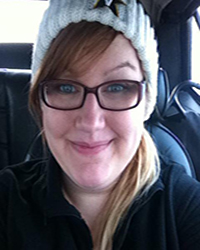Topic Tuesday: Support

“Thank You” (By: Mackenzie Fox)
The very best thing about my recovery from an eating disorder has been the way that my friends and family have rallied around me. I have been blessed with a support system that listens when I need an ear, hugs me when I need the embrace, and allows me to move slow and steady in my recovery.
When I hit my lowest and sought out help, the first people I spoke to were my parents. It was hard. Harder than deciding that I needed help. I felt like I had disappointed them, that I had let them down. I tried to explain to them, in the best way that I could, how my world felt like it was just crashing down around me. I told them that the behaviors that I had previously used to make me feel like I was in control now left me feeling like I was going to die. I’ve never asked, but I felt like they may have been heartbroken. Parents are here to protect their children and I think they thought they may have failed. It was an awkward time for our family because we have always been close. Obviously this was not the case. My eating disorder was my own. No one gives parents a manual on how to support your child during their battle with an eating disorder. I believe that if recovery is a college course then supporting someone in their recovery could easily be a Masters degree. What do you do you say? What should you absolutely not say? What if you notice XYZ? It’s a road full of potholes that’s almost impossible to navigate sometimes.
I was not the easiest person to deal with during the beginning stages of my recovery. I was emotional all the time. I was on edge. I was trying to balance my life without my previous behaviors as best I could. And my parents stood with me the entire time. Not holding my hands, allowing me to find my new balance but letting me know that they would be there for me should I slip. It was the best possible thing I could have asked for.
Recently I had sat down to dinner with them after a big family reunion. My grandfather is 90 years old and suffering from dementia. He had made a few comments about my sister’s weight and my mom was worried. She was worried about what those comments had done to her oldest daughter but she was also concerned about if hearing that was triggering to me. Before I had a chance to respond, my mother, not a crier, had tears sliding down her cheeks. “I’m just worried that I was the one who gave you an eating disorder.” Even writing that sentence out now sounds a bit ridiculous. Both of my parents have dealt with their own mental illnesses, in a time where mental illness wasn’t necessarily dinner conversation like now, but my eating disorder is my own but their support of me has never waivered.
If you are reading this and are in recovery, tell your support group how much you love them. If you are reading this and you are supporting someone in their recovery, THANK YOU. We might not say it often enough but you are the lifesavers.
About the Author
Mackenzie Fox is a Nashville native who is happy to share her stories of her eating disorder and recovery in hopes that she can help others. She spends her days weight lifting, mentoring high school students as they prepare for college and spending time with her two cats, Tonks and Maleficent. She is a total cat lady and goof ball who wants to show people that there is absolutely an amazing life after an eating disorder.


Comments are closed.